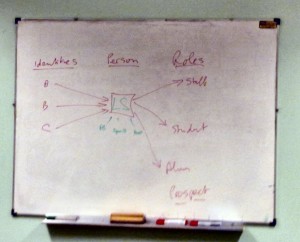Just returned from the JISC Innovations forum – taken aback by the huge quantities of positivity and enthusiasm from delegates – despite these straitened times.
The word that one seemed to hear every few seconds was open. Open data, open source, open knowledge. It got me thinking about what we mean by open. Lots of people try to qualify it – ‘open does not mean free’ was one phrase I heard. Not sure I agree with this. Is something still open if you start to attach conditions to it which may exclude some from being able to use it? It is still open to some – those who can afford or wish to pay for it – but it is no longer open to all. The definition of open knowledge given by the Open Knowledge foundation is:
A piece of knowledge is open if you are free to use, reuse, and redistribute it — subject only, at most, to the requirement to attribute and share-alike.”. (c) Open Knowledge Foundation
Which explicitly says it must be free.
This leads me to thoughts about another use of the word : OpenID . Part of the Logins for Life project is looking at the possible use of technologies like Open ID and Facebook Connect as acceptable credentials for access to HE on-line resources.
Is going this open wise?
I should say from the outset that no-one is proposing we let just anyone with an OpenID roam at will through the entire online resources of a University or College. But it could be a useful tool all the same.
OpenID would allow those applying for a prospectus or even just browsing the web site to easily establish a digital identity with the provider – no forms to fill in, usernames to invent, email verification etc. The vast majority of users will already have an OpenID – though it is probably still true that many won’t realise this – through previous registration with Google, Yahoo, Flickr, MySpace and many other popular websites.
There are obvious advantages –
- interested parties immedately gain a sense of ‘belonging’ or ‘membership’.
- the host organisation has the opportunity for email contact with these potential students or staff.
- the user does not end up with one more username/password combination to remember.
But are there disadvantages too?
If these prospects do join the university then it would be possible to link their OpenIDs with their Kent log on credentials and allow access to at least some online resources. A liberating open attitude or the on-line equivalent of leaving the key in the door?
Anyone out there already using OpenID within the Higher Education world? Or planning to?
